Inclusion, participation, democracy, we shout silently from our desks in our soundproof, air-conditioned classrooms.
We need Development, we shout—and Real Development, not Western Development. There are communities whose labels we like to keep in our back pockets (we are development studies students, after all): slum dwellers, tribals, homeless, lower income groups, villagers, Dalits, minorities. Their voices are being suppressed. It enrages us. We have to want to develop them—no, we are from the new age of Development; we have to want to help them to develop themselves. That means help them make their lives more like ours, because we definitely don’t want our lives to be more like theirs. They are being excluded, we say, shaking our heads at the injustice of the establishment. They are being alienated. They are being deprived of their right to live (Article 21). They have no Recreation, no Real Shelter, no Real Education, no Say.
Say?
When I was in the first grade, in a sprawling, disconnected New York suburb, there was a pretty girl in my class with dimples and braces who formed a gang of other pretty girls with dimples and braces and together they would routinely do the rest of the class a great favour by temporarily allowing other girls to eat lunch with them, at their convenience. The pretty girl was kind. She wasn’t a bully. She talked to me when I talked to her. She didn’t want anybody to be left out too much.
I was a slightly slow child, always finding it difficult to pay attention because I was too busy drawing or thinking or staring out the window and talking in different accents in my head. I kept busy with my important work that involved crayons and stuffed animals. I had beanie baby students who loved me because I always gave them lollipops and A’s.
I had a say. I was saying plenty.
The pretty girl insisted I join her circle for lunch for a few days, where I sat silently and got bored out of my mind, because I did not know who Jessica Simpson was and she did not like to talk to her toys.
Now I don’t have beanie baby students anymore, and I don’t talk to myself as often. I joined the pretty girls whose job it is to be just and kind. I read political magazines and make cynical jokes about the B.J.P. I look at fisherwomen on the train, sitting peacefully on the ground next to me, from very, very far away; and as my feet ache from civilly standing for so long, my training tells me, bizarrely, that it is they who are left out, and it is the fault of the government or politicians or policymakers, because why do they have such terrible lives? It’s not right. It’s not fair.
I am supposed to feel outrage on behalf of these left-out people, and write acidic editorials in the newspaper about inequality and make documentary films to spread awareness about their lives and to send a message to the world about participatory and inclusive growth and upliftment and “how much work there is to do!” It is my duty as a development studies student. But what does a development studies student who feels underdeveloped herself do?
On the first-class ladies’ compartment on the train, every day at least one schoolboy in a government school uniform will be standing at the door, confident as a C.E.O. Before I realised that schoolchildren get a concession for their first-class passes and the ladies’ compartment refers to both women and children, this tendency confused me. Then I wondered why no one protested. Out of something that I think was more disorientation than anything else, I once ventured, as I boarded, “This is the ladies compartment.” He ignored me, good-naturedly watching a game his friend was playing. I poked my face in front of him, feeling sillier by the minute. “Do you have a pass?”
He looked at me then, smiling, not at me, but about something else in his life that was making him too pleased to bother with me, and clicked his tongue and shook his palm in the most nonchalant “no” one can say, all the while his eyes darting away from me to more worthwhile things. They all laughed then (half at me, I’m sure). If I had been in their position and laughed then, it would have been an uncomfortable laugh, but from their chests it was a confident and carefree one. I still don’t know how children do that. It’s absolutely bizarre. Now, whenever I get on the train with my fancy first-class ticket, I pass the boys with my head down and my regret loud, and take my seat casting them envious looks.
I can’t travel without a ticket. I can’t sit on the floor of a crowded train compartment and confidently use all the space I need for myself and my baskets. I can’t be the bossy teacher and control my world anymore. I can’t meander through the streets on the wrong side of the tracks because for me, poetic curiosity is not as valuable or justified a way of life. A person’s way of life is an act of ownership, of self-sufficiency. I cannot claim that over other peoples’ lives using institutionalised knowledge or poetic curiosity. Poetic curiosity is what excludes me. It makes my life in Bombay an act of intellectual and artistic tourism. It makes me different from the things I want to be a part of. I look at street art and feel lost, childishly left out. I couldn’t join a group of men spray painting a concrete wall no matter how much I wanted to or how much I appreciated their work. I stare at it, take photographs, linger around graffiti and interesting slogans, and draw my own in my head, and ponder over it in trains, but I can’t create it.
It seems like the fate of a development studies student is to be cynical and dissatisfied in an educated but distant way; to respectfully-condescendingly consume counter-culture that makes us sentimental and stimulates our debating skills and our ability to recall the latest Tehelka article. But there is no sense of the need to create it ourselves, to be in it, to be included. To be developed. Isn’t the act of “developing” someone, like everything else, a form of othering? Why does my life, with all its supposed security and comfort and opportunity, set the standard for what a healthy, privileged life should be like? Who am I to decide that fisherwomen and government schoolchildren fall into the “underprivileged” category? Who am I to define who is not getting a say, when perhaps a way of life is a say in itself that some people have the confidence to claim and others don’t?
I am not as confident about my identity or the point of my existence as are my new friends Aarti and Sagar, who live at Matunga Road station and collect and sell garbage in Dadar and who insist on having me over for dinner one day because I am so far away from my parents’ home in Bangalore. And yet I am privileged and they are not. I walk through the city feeling like an outsider, like I have not yet grasped what it means to really live and be alive in Bombay. My research professor told us on the first day of college that developmental research is not about seeing problems or figuring out what peoples’ lives lack, but about realising the ways in which they are empowered. I still don’t think we—or our education system—have taken his advice.
I can call what I see comfort, street smarts, self-sufficiency, excitement, soul, whatever, but what I see is something I feel excluded from, my education the baggage I carry with me at various doors as they shut in my face. I think the word development needs to stop being thrown around and sincerely thought about on a very personal level. Perhaps I have more to learn from having dinner with Aarti and Sagar, or sitting on the ground in the local train, than I do from interacting with N.G.O.s and activists and policymakers, about what kind of inclusion is really not taking place.











Please tell me this was a joke.
“Why does my life, with all its supposed security and comfort and opportunity, set the standard for what a healthy, privileged life should be like?” Because you have access to clean drinking water and if you didn’t, won’t be raped on the way to the well because you’re from a lower caste.
There is objectively analysing what constitutes privilege and then there’s romanticising “the other side of the tracks.”
You’re ostensibly “developed” and underconfident. They’re “underdeveloped” and confident. Therefore you feel your life is not necessarily a paradigm on which to model theirs. Sure, but don’t deny them the chance to be developed and confident. Their confidence and easy familiarity with Mumbai does not stem from the fact that they collect garbage any more than your lack of confidence arises because you study DS. You have not seen poverty and hunger and deprivation and you believe these things instill soul and grit and character. And perhaps they do. Should you therefore go around spreading penury and starvation?
Who are you to decide what to name categories, you ask? The answer is, you don’t have to. The underprivileged do not need your ironic quotes, their lack of privilege is not the social construct you make it out to be – they are simply underprivileged because they lack the privileges you have. You can slough off your privileges and join them for dinner, but they can’t transcend their status quite so simply. Is not the fact that they strive to attain the privileges you enjoy proof enough that they are underprivileged? There is nothing noble about poverty.